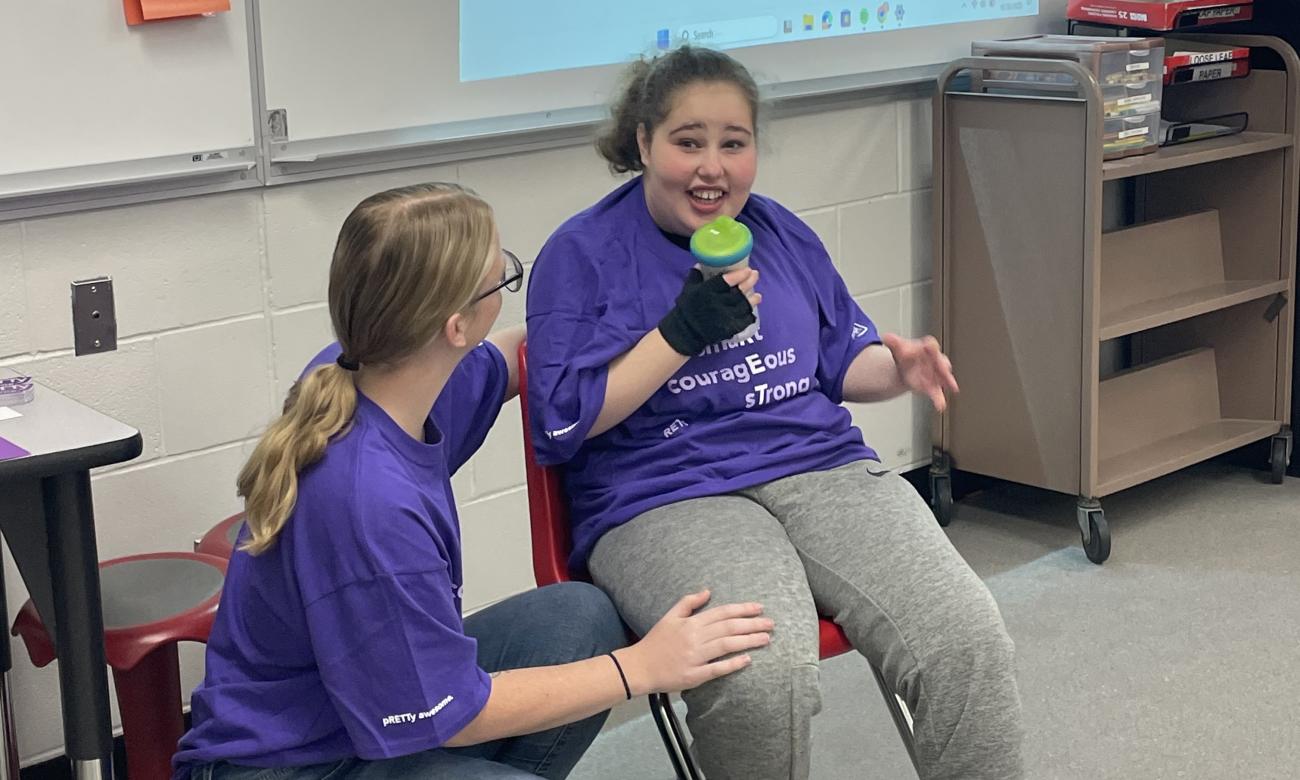Bonny Fehr dreams of a kinder world, especially when it comes to kids with disabilities. Her 13-year-old granddaughter Peyton lives with Rett syndrome, a relatively rare genetic disorder that affects brain development and causes impairment to one’s language and physical coordination.
Between 600 to 900 people have been diagnosed with Rett syndrome across Canada, most of them girls. That’s because it’s caused by a genetic mutation in the X chromosome on a gene known as the MECP2.
October was Rett Syndrome Awareness month, leading Fehr to visit Peyton’s classroom at the Niverville Middle School on a mission to educate approximately 50 of her granddaughter’s peers on what it’s like to live with the disorder.
In the process, Fehr hopes to reduce the anxiety, uncertainty, and misconceptions other kids might experience around children with disabilities. This is her way of making the school environment a more accepting and loving space for everyone.
Uncommon as Rett syndrome may be, there is a national alliance dedicated to creating awareness. Fehr and Peyton’s mother, Shayla, are actively involved with the Manitoba chapter of the Canadian Rett Syndrome Coalition (CRSC).
Peyton has been nonverbal for most of her life. She can walk and use her hands, but with difficulty. She wrings her hands and has other characteristics similar to an autistic child.
“The thing that I want people to understand is that although Rett kids are nonverbal, they are very aware of what’s going on,” says Fehr. “It’s almost like they’re trapped without their words. I think that is the most heartbreaking.”
On October 20, Peyton sat in a chair facing all her peers with a grin from ear to ear while Fehr made her presentation.
“We put Peyton in front and she was watching her peers as we did the presentation and she was so happy,” Fehr says. “It’s like she knew it was all about her.”
Just as Fehr had hoped, the students were remarkably receptive and curious. Each went home with an information packet and T-shirt in the hopes that conversations about Rett syndrome would continue around the family dinner table.
Peyton’s early development began just like any other toddler. She crawled and then walked, all the while developing her language skills.
“At around two years old, we noticed that she wasn’t gaining new words,” Fehr says. “The words she had already learned, she was losing. And then her gait started changing. Her walk wasn’t as confident. She just really started to go backwards.”
This regression is a distinctive sign of Rett syndrome in kids, only Fehr and her family had never heard of the condition at the time.
Peyton’s symptoms slowly worsened. She soon lacked the depth perception to determine whether a surface change was a minor step or steep drop. And eventually, her use of language disappeared completely.
In the meantime, Fehr took notes and sought a diagnosis. Unfortunately, the wait time at the Child Development Clinic was long. Still, Fehr called the centre, leaving message after message about her observations.
Her persistence finally paid off.
“I finally got this call at work saying, ‘Bonny, I’m a doctor from the Child Development Clinic and I must say, I have never had a mother, much less a grandmother, advocate so well for their child. If you can get a doctor’s referral, I’ll have you in next week.”
In short order, Peyton underwent testing. Initially, everything pointed towards autism. For Peyton’s mom, that diagnosis just didn’t feel right so they pushed a little harder. Subsequent genetic testing led specialists to Rett syndrome.
Fehr says that the day they finally got an accurate diagnosis is the day she felt like she was seeing her granddaughter for who she really was, and it was beautiful.
While there is no treatment for Rett syndrome, a new drug has been released in the last year that shows promise. Unfortunately, that drug is expensive and not covered through Manitoba Health.
In the meantime, Peyton is finding creative ways to communicate without words. Mostly, it’s anything she can do to capture attention—for instance, flicking the light switch when the person she needs to communicate with is in the room.
Fehr and her daughter are also grateful for the help Peyton has received through the years.
Thanks to the Niverville Middle School, Peyton has had access to a tablet with eye-tracking technology. When Peyton’s eyes lock on a picture, the machine verbalizes that word.
More recently, Peyton was gifted a three-wheeler bike by a children’s charity. She rode it for the first time at this summer’s Rett syndrome fundraising walk along with 30 family members.
It’s things like this that make kids with disabilities feel like they matter. It’s too bad, Fehr says, that there aren’t more financial supports available for parents to purchase specialized items for their special needs kids.
“The things these kids need, why do they have to cost so much? A parent is already trying to navigate life and to help the child as best they can. Yet for children with disabilities, everything costs way more.”
Respite, too, is poorly funded. Fehr is thankful that she and her husband have been able to offer that to their daughter. In return, Peyton teaches them much about life, despite her inabilities.
“Seeing who Peyton is and how she’s growing into this beautiful woman, and how she’s living life to the best of her ability, that makes me want to be a better person,” says Fehr.
Fehr has also witnessed the incredible impact Peyton has had in her school.
“Although Peyton is nonverbal, she’s very verbal. There’s a lot of Rett kids that are very quiet, but not this girl. She laughs and giggles. She’s just a ball of energy and joy. And the thing I love hearing the most is that, when she misses school, she is missed because you don’t hear her laughter in the hallways.”


